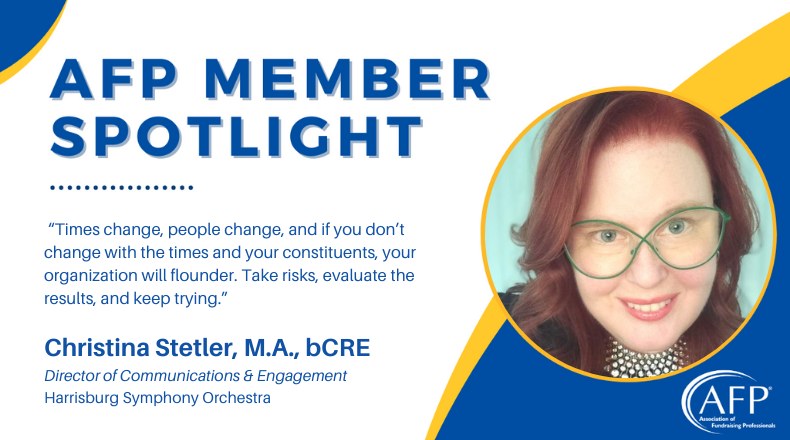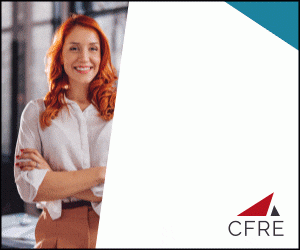AFP Member Spotlight: Christina Stetler, M.A., bCRE

AFP Member Spotlights are a recurring series of interviews with AFP members, highlighting the unique individuals and career paths that exist within the fundraising profession. If you know an inspiring fundraising professional who deserves to be featured, please email afpmarcom@afpglobal.org.
In this Member Spotlight, we interviewed Christina Stetler, M.A., bCRE, director of communications & engagement at the Harrisburg Symphony Orchestra. She shared with us how participating in an AFP meeting gave her an innovative idea during COVID and how important it is to communicate with others in the field to confirm the trends you’re seeing in your own fundraising.
Q: How did you start your career in the fundraising profession and what led you there?
A: During my senior year of college, the capstone course for my communications program required us to work with a nonprofit organization on a project. I worked with Junior Achievement of Central PA on their Phone Calls from Santa campaign, creating their advertising brochure, writing their training program, and assisting with public relations activities.
After graduating with my BA in communications, I began applying to nonprofits and was soon offered a part-time assistant position with the Southern New Jersey Chapter of The Leukemia & Lymphoma Society. I got to work immediately with their June golf tournament and August regatta. I spent five years with LLS, moving in that time from part-time assistant to a divisional manager with a $500,000 budget.
Q: When and why did you decide to become an AFP member?
A: I became a member in 2019 when I started working for my current employer, the Harrisburg Symphony Orchestra. I had always wanted to join, but most of the organizations I worked for didn’t pay for professional memberships and I didn’t have the funds personally to pay for a membership.
Q: Are you doing anything innovative at your organization (or past organization) that you think other fundraisers would benefit from?
A: It’s not innovating per se, but I am focusing on the personal touch more and more with donors and those associated with my organization. I have gone back to the concept of letter writing and sending notes to donors, board members, friends, group members, etc. to thank them for their time, talent, or donation. Often the next time I see them I get thanked for the note and told how nice it was. I know letter writing is not as common as it was, so the real piece in the mail is making an impression with those engaging with my organization.
Q: What is your favorite word? (only one word) How has this word influenced or inspired your career?
A: My favorite word is Learning. Most people did not enjoy school, and I can’t say I enjoyed all of the subjects, but I have always loved learning about subjects that interest me. I do not think you can graduate from a program and say, “I know everything now. No need to continue learning.” It is a lifelong pursuit to make yourself the best you can be. Whether you attend in-person trainings, webinars, talk with those with more experience in your field, or read books/magazines/online articles, there is always something new to learn. There is always something people have done differently. The world is too big to think we know all we need to succeed, whether that’s in our careers or our personal lives.
Q: What professional accomplishments are you most proud of?
A: In my first position with The Leukemia & Lymphoma Society, I wrote a business plan to create a divisional fundraising program across three separate chapters. I had never written a business plan before, nor was I a business major who studied them. I did a ton of research on what they were, what they included, and how they were structured. I created the plan, and the divisional executive director presented it to the national VP of development. (He knew who I was as he lived very close to our chapter and often attended our fundraisers.) After the he read the business plan, he asked if the divisional ED wrote it, to which she said no. He asked if the chapter ED wrote it, to which she said no again. She told him I wrote it and he said he was impressed that a staff person at my level could write such a comprehensive and thorough business plan. It was approved and I had the pleasure of taking the business plan and implementing it.
I am also proud of an annual appeal campaign I helped create in May of 2020. I attended a peer-to-peer call with AFP in the spring of 2020 when the world seemed so hopeless and insecure on whether fundraising was something we should be doing or not. Someone on the call stated a local nonprofit in their area did a campaign that sent forget-me-not flower packets to their donors. I brought this back to my organization, we ordered flower packets, created a personalized card to reflect the theme, wrote a poem for the inside, and digitally had our entire staff sign the card. We sent that out the second week in May (the week before Mother’s Day) and raised over $60,000 in 6 weeks. We were thrilled with the response, and we received photos later with people’s flowers.
Q: How has being an AFP member and participating in the AFP affinity groups benefited you in your career?
A: It has given me perspective overall in the field. It can be awfully lonely fundraising and seeing your own metrics. Having the opportunity to talk to people around the country, and globally at times, allows you to hear that you aren’t alone in what you’re seeing. Often trends we see are being reflected elsewhere. And while no one wants to see downward trends, it is good to hear that it is not necessarily something we are doing wrong, which can easily be the thought when you aren’t interacting with people outside your organization.
Q: In your opinion, what is the biggest challenge facing the nonprofit fundraising profession today?
A: Practically, I think it’s the loss of the tax-deduction for donors under $12,000/$24,000. While we all want to think of ourselves as philanthropic, we have seen a marked drop in the number of donors since 2018, when the tax laws changed and our low-to mid-level donors could no longer make a donation they could write off their taxes. Why donate when they will receive nothing back on their taxes and the price of things is continuously going up without much of a cost-of-living raise (this was a thing before COVID, but only increased afterwards)?
Q: What advice do you have for other fundraising professionals, or people interested in getting into the field?
A: My advice to other fundraising professionals or people interested in getting into the field would be to be open to new ideas and ways of doing things. The worst thing that you can hear/say is, “We’ve always done it this way.” While there are best practices in the field, there is also the opportunity for creativity and innovation. With the “we’ve always done it this way” mentality, you truly cannot fulfill your mission. Times change, people change, and if you don’t change with the times and your constituents, your organization will flounder. Take risks, evaluate the results, and keep trying.




